All cat owners want to know whether their pet loves them as much as we love them, and while they may not be able to tell us in words they have developed many easy-to-spot bits of body language to help communicate their mood, needs and how much they love us.
However, as many owners will attest, feral cats will have have their own ways of showing their affection towards their favourite person – they also have their own unique ways of showing you they are happy.
In this guide I am going to explain what the tell-tale signs are that show your feral cat is happy, plus some other signals they can give to show they love you unconditionally.
How do I know if my feral cat is happy?
There are numerous ways that feral cats can show us how they are feeling, through their body language, the way they act and even their physical health.
Each individual cat has their own personality and quirks that you will learn to read very well, but here are ten common signs that most cats use to show their happiness:
1. Smiling face
A ‘smiling face’ in a cat means that they have their mouth open, with a few teeth being visible but without being bared. They will have happy, large and round eyes, with a relaxed brow and their tongue may also be hanging loosely out of their mouth, the classic sign of a happy cat.
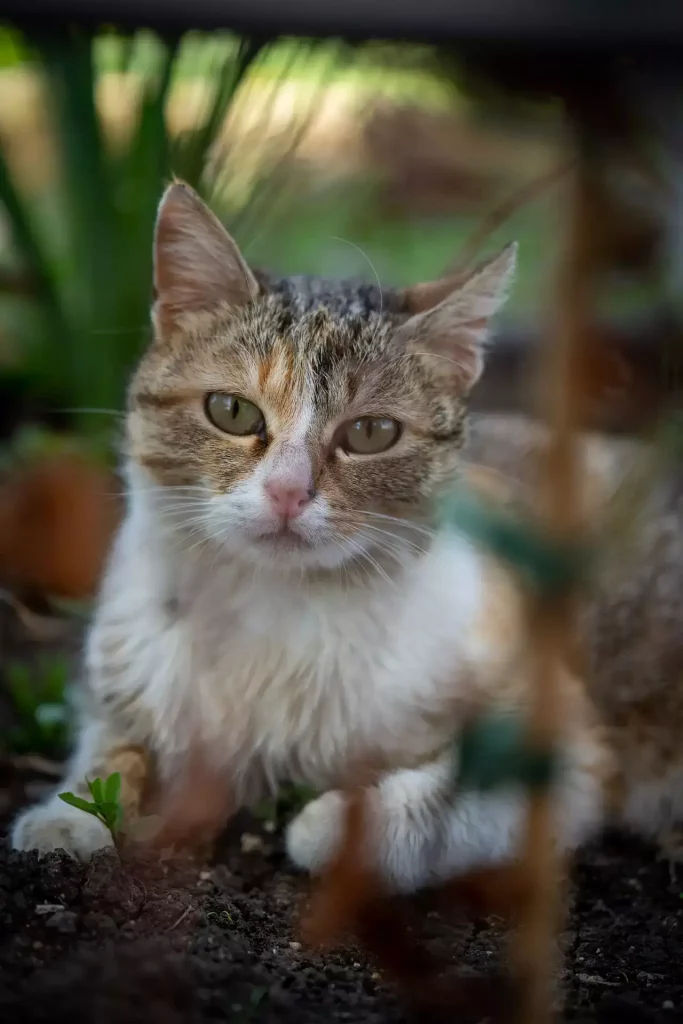
Feral cats that are unhappy or are feeling stressed and depressed will usually keep their mouth closed, as well as licking their lips occasionally, which can be a sign of anxiety. If you have noticed that your cat is looking stressed or unhappy, reassure them or remove them from the stressful environment before it causes them any continued distress.
2. Bottom and tail wagging
A wagging tail is the traditional sign of a happy feral cat, with their tail raised high and waving around when around you or other cats.
However, because of their short tails, feral cats often find it hard to wag their tails very much, but they will waggle their bottoms with just as much gusto.
An unhappy or depressed feral cats will either have their tail down, without any wagging, or will put it between their legs. This is a sign of submission and fear, and if your cat is doing this it is best to remove them from the situation or separate them from the cat they are responding to.
3. Kitten cat eyes
When your English cat looks at you with loving eyes, they will have a relaxed expression and a smooth brow, with unhappy or aggressive cats narrowing their eyes. When they do this, it means the love you and are happy to show it!
Feral cats also raise their eyebrows to make their eyes look bigger, which they have learned triggers us to be more affectionate to them. This is because of evolutionary nurturing responses that responds to things that look more like infant children.
4. Relaxed smile, ears and body
Along with a smiling mouth, a happy feral cats’s expression will also come with flopped ears and a relaxed body posture.
Ears are always a good judgement of how your feral cat is feeling, with unhappy or scared cats having their ears flattened back and perked up ears being a sign that they are listening out and aware of their surroundings.
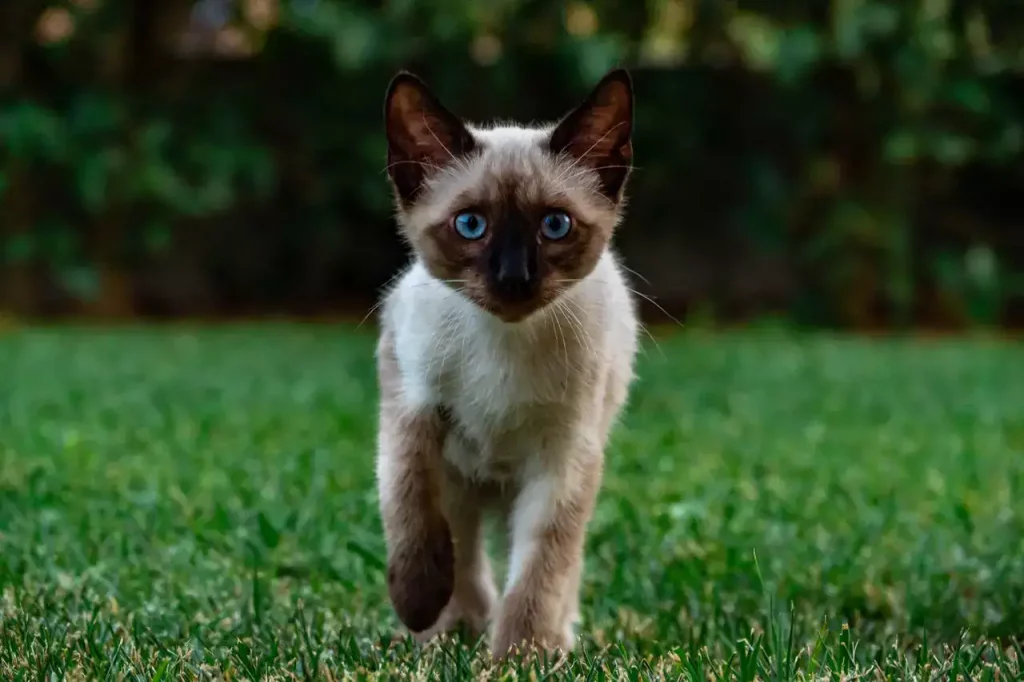
For a cat to have relaxed ears means that they are comfortable in the situation and aren’t on their guard around you. Their body language in general will also be more relaxed, with their tail resting or even wagging slowly and their tongue hanging out.
A relaxed and happy feral cat may even be comfortable enough to sleep around you, especially if they are already closely bonded with you.
5. Playing around
Obviously, a happy cat is a playful cat. They will run around, play with toys, people and other cats happily, and they will still run around and play with toys, as well as engaging in tugs-of-war with you if they don’t fancy moving around much.
When cats play, they often go into a ‘Play bow’, with their forelegs flat on the ground and their bottom and tail raised high in the air, This is a cat’s way of asking other cats and their owner if they want to play, which, when reciprocated, will initiate play.
If you furry friend wants to play, you will have no doubt that your feral cat is happy.
6. No destructive behaviour
Bored, anxious or stressed cats can often be very destructive around the house, such as biting furniture, tearing things apart and generally trashing the room.
People with cats who have separation anxiety often find that their cat has destroyed the house after being left alone, and it can be the same even if you are in the house with them. Unhappy cats will also be uncooperative and difficult to handle on walks, hinting towards something that is causing them stress or anxiety.
Destructive behaviour can be helped through training, as well as finding the root cause to the problem, such as boredom, too much excess energy, separation anxiety or another cause.
Quite often these behaviors can be corrected through taking your cat on longer walks, giving them new toys to play with to occupy themselves, and removing them from an environment they find stressful.
In simple terms, if your feral cat is being destructive, it’s a sign that he is not happy and could even be depressed.
7. Plenty of appetite
Feral cats are usually up for eating anything and everything (here’s how much they should be eating), so if your cat is off their food then it could be a sign that they aren’t happy or feeling well.
As well as a decreased appetite, if your cat’s appetite increases it could also be a sign that something isn’t quite right.
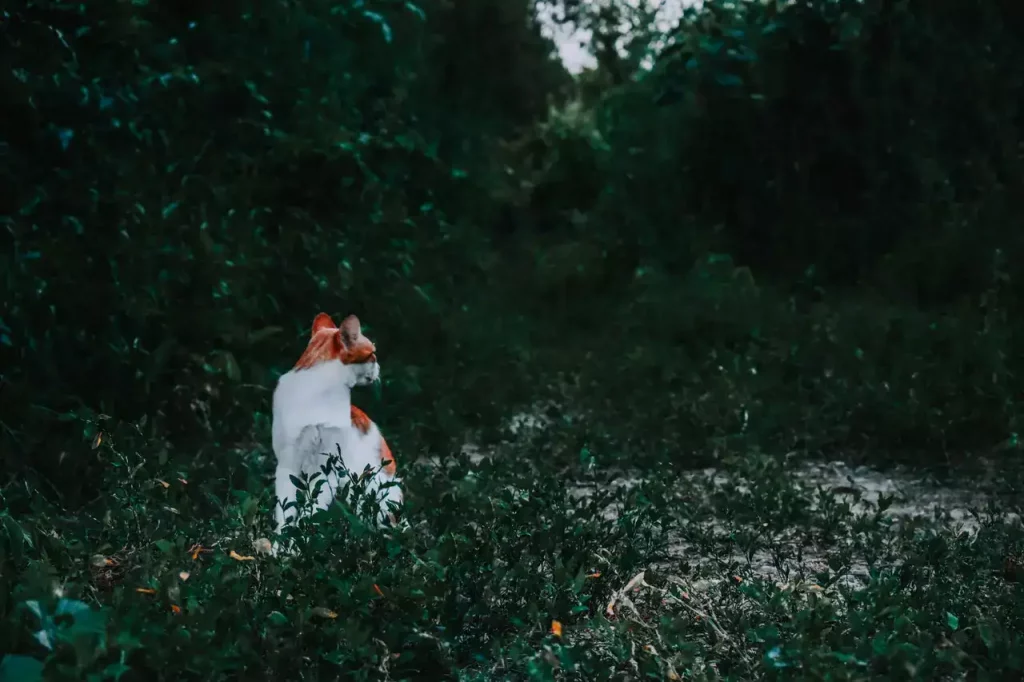
If you are concerned that your feral cats’s eating and drinking habits have suddenly changed, please contact your vet who will be able to examine them for any illnesses or conditions that could be causing the problem.
8. Tongue hanging out
Another way you will know if your feral cat is happy is if she sticks his tongue out; this isn’t just a way for them to cool down. Along with a relaxed smile, cats also show their happiness by rolling onto their back and wiggling around, with their tongue out.
This is usually an invitation for belly rubs. However, submissive belly rubs are very different, with their bodies being stiff and their mouth closed; a sign that they are feeling afraid and don’t want to fight. Cats will often perform submissive belly rolls when around more aggressive cats or in situations that they find frightening or overly stressful.
9. Shiny and healthy coat
A healthy cat is a happy cat, and a shiny coat is a good sign that your feral cat is happy, well fed and healthy.
You can keep your cat’s coat shiny through regular baths and brushes, good quality food, nutritional and vitamin supplements and keeping them well exercised and healthy.
How do you tell if your feral cat loves you?
Feral cats aren’t subtle with their affections, and if they love someone they will definitely make it known. Once you have owned a cat for a while, you will begin to recognize some of their more individual ways of showing affection, but there are a few ways that feral cats will show you that they love you.
10. They are happy to see you
There are millions of videos on the internet of cats going crazy when their owner returns, from just a walk to the local store or from being months away overseas, and you may find your cat is just the same.
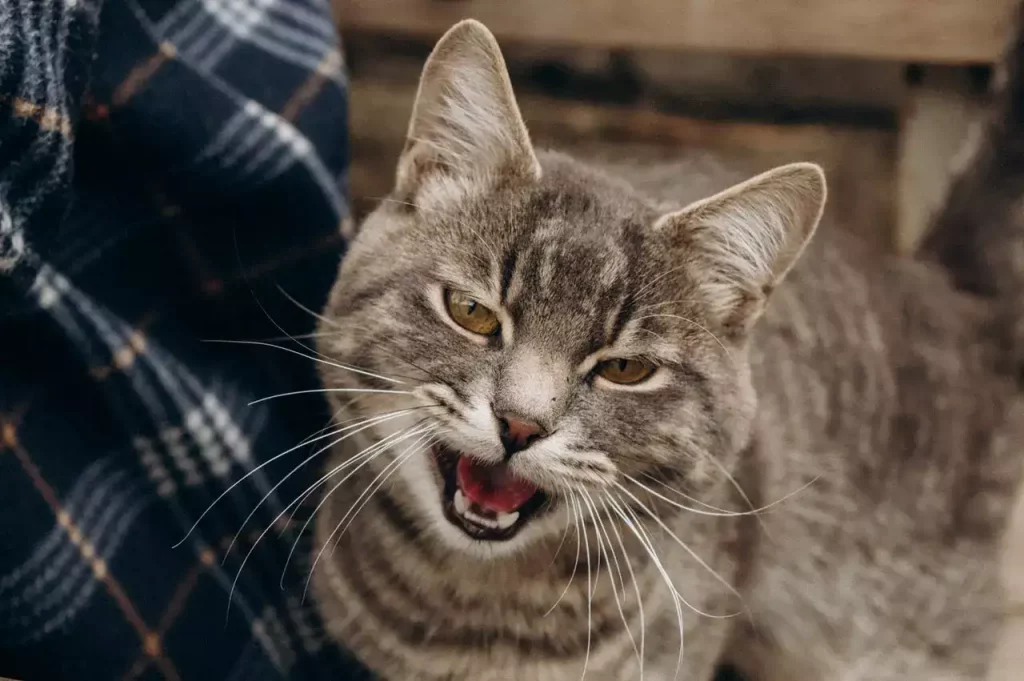
When you come home, your cat will be overjoyed at you being there, jumping up (unless they’ve been trained not to) and trying to get your attention to pet and play with them. While this can cause some disruption when you first step in through the door, it is a sure-fire way of knowing that your cat really likes you being around and loves you to the moon and back.
A feral cat that doesn’t like you or is depressed and unhappy will either not pay you any attention or will actively avoid you, at worst growling or acting aggressively towards you.
11. They lean on and into you
This is easier to notice for larger and heavier cats, but cats of all sizes do this. When you are petting them, your cat may lean their bodyweight against you, either into your leg or side. Even when you are stood up or when you are sat down, they will also seek bodily contact and physical affection, such as cuddles or pets.
This is not only a sign of a happy feral cat, but one that really loves the attention that you give it, feeling safe enough around you to fully relax into you and may even fall asleep on you.
12. They keep eye contact with their human master
When you are training your cat, walking them or generally playing around, your cat may hold your eye contact for a prolonged length of time. You may be wondering why they do this, whether it is a sign of dominance or if it is just something they do.
Actually, it has been scientifically proven that when you and your cat share eye contact, their brain released oxytocin, the same hormone that mother’s get when they look at their baby.
This means that when they are looking into your eyes, they are feeling the same way that you feel when you see them.
However, don’t try and force eye contact with your cat. Eye contact has to be natural and forcing it can come across to them be a sign of asserting dominance, potentially make your cat uncomfortable or even wary.
13. They steal your stuff for fun
Feral cats have an incredibly strong sense of smell, being 40 times more sensitive than ours, which means that everything has a smell. You may have noticed shoes, socks and other items of clothing going missing, or found your cat walking around with one of them in their mouth.
This is because the item smells of you (as well as being fun to chew and play with). You can discourage this through training and get your socks back by exchanging it for another toy, treat or sock that you aren’t using.
Taking an item forcefully can be mistaken by them for play, or it can make them more protective over things and even cause growling or aggression.
But if your bully constantly steals your stuff, don’t be too hard on him. It’s just your feral cats’s way of showing he loves you!
14. They sleep around you at night
Cats won’t sleep in a situation that they feel uncomfortable or unsafe in, so for them to fall asleep around you, such as when you are sitting with them, is a sure sign that they are completely comfortable and feel totally safe in your presence.
Your feral cat may also want to sleep in your bedroom when you turn in for the night, even if they are not allowed on the bed, as they want to be close to their family or pack during the night.
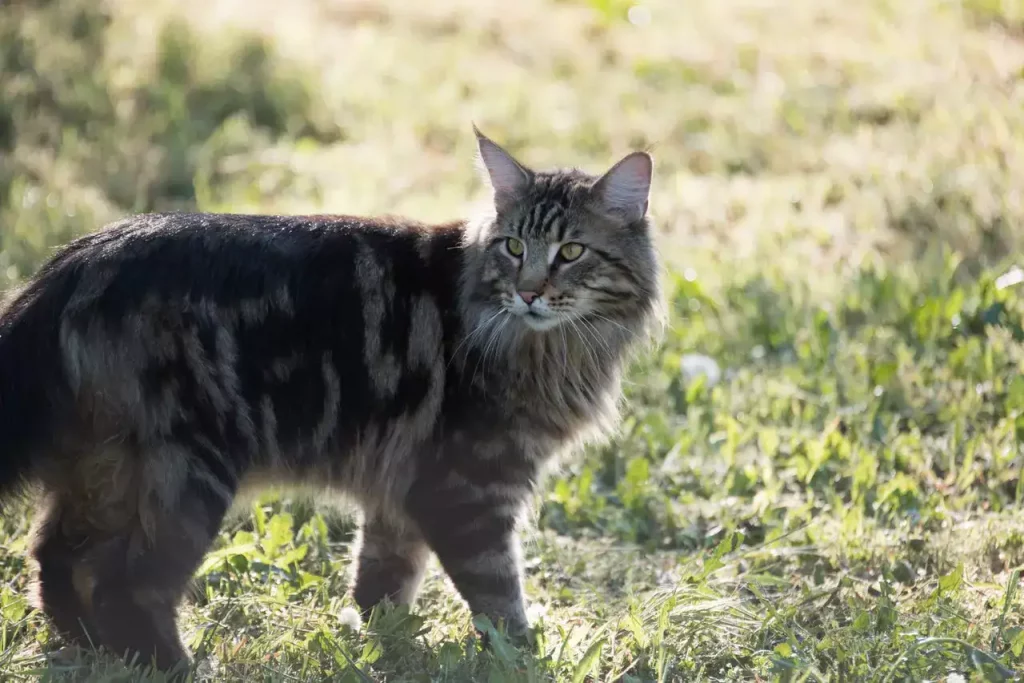
Your cat loves you, is happy, and wants to share your warmth… cute!
15. They check in on you all the time
While some cats are always following you around and stick to your side like a shadow, other cats are more independent and like to spend time on their own. However, they will still pop into your room occasionally to check that you are still there and that you are alright.
This is also why cats often come back to stop to look behind them while on walks, especially in new environments, so that they know exactly where you are.
You are your cat’s world. If he wants to be around you all the time, your feral cat loves you more than you can imagine.
16. They are outwardly affectionate
As mentioned before, cats aren’t very subtle when it comes to showing their affections. Most cats love physical contact and affection and will actively seek it, lying on you, jumping up and seeking you out to get cuddles and pets from you and other members of your family or friends. They will also curl up close to you, sleep on you or even sleep leaning or resting on you.
All feral cats are individuals and do have their own personalities, little quirks and behaviours that are unique to them, and over time you will be able to pick up on these very easily.
All in all, cats are quite easy to read when it comes to their body language, with some traits such as raising their eyebrows having been developed through domestication for them to be able to more easily communicate their emotions to us.
Cats are very physical in their affections, so if your feral cat is happy to see you, wagging their tail and enjoys playing with you, then it is very likely that they really do love you as much as you love them.
Conclusion
To be honest, after owning your feral cat for a few months you will soon pick up on his own little signs of happiness and affection. All cats are different, and whilst I’ve listed a lot of ways in which you can tell an feral cat loves you, yours might do something completely different.
The bottom line is this; providing you give them love, affection, care, and keep them healthy and fit, your feral cat will be happy and loveable – that’s all they need!
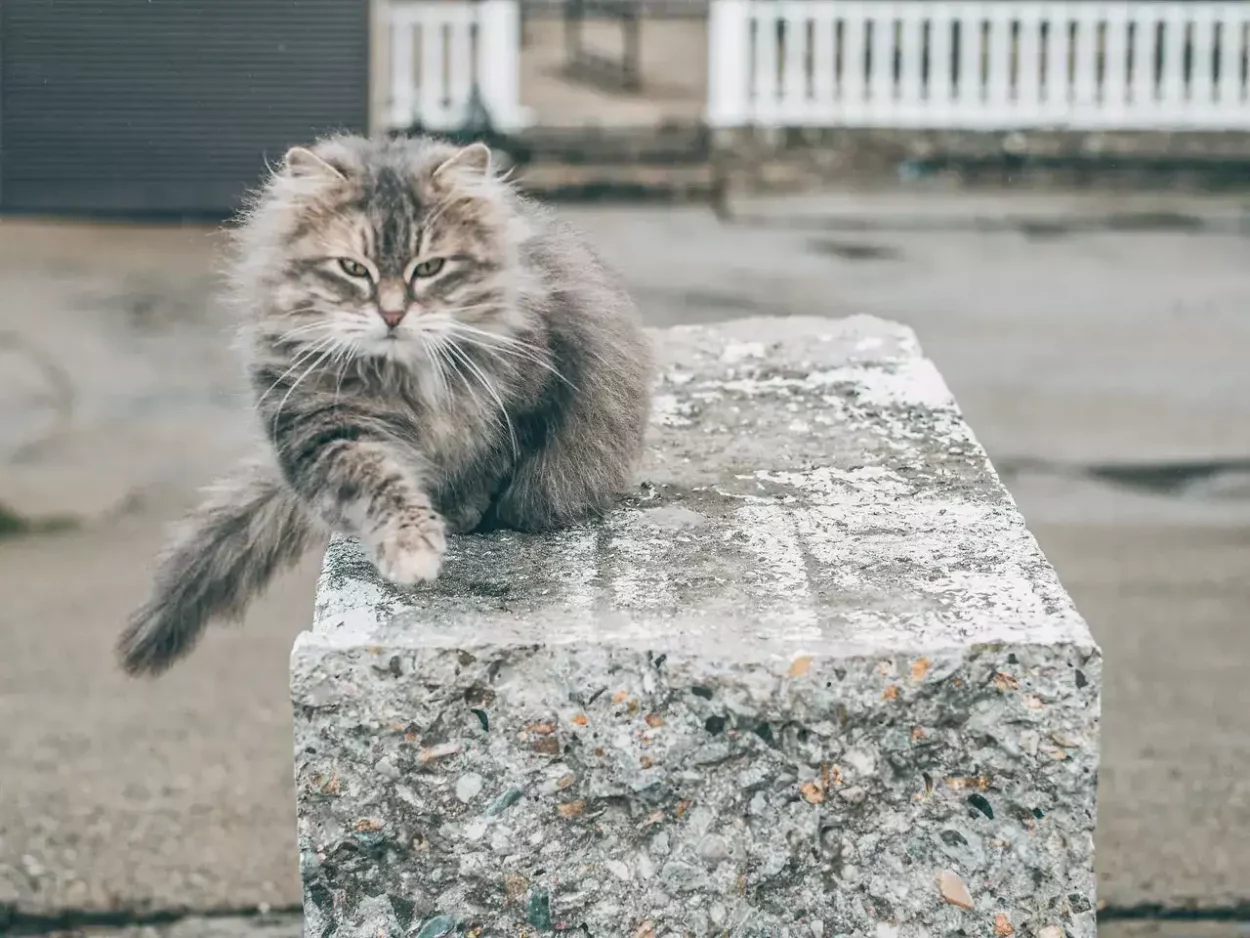
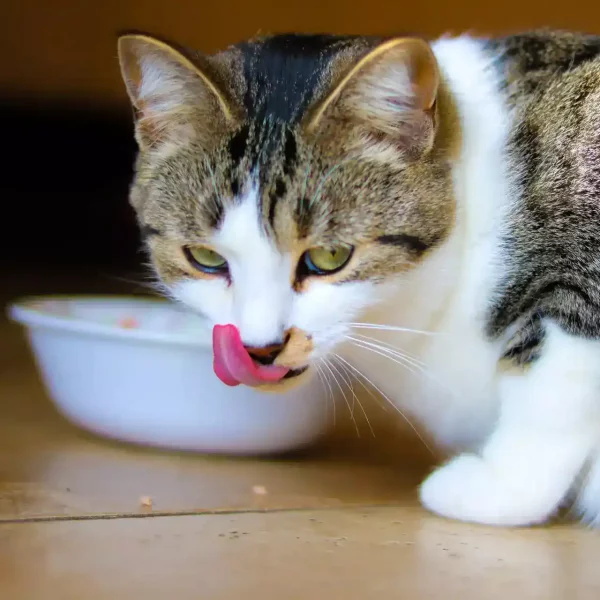
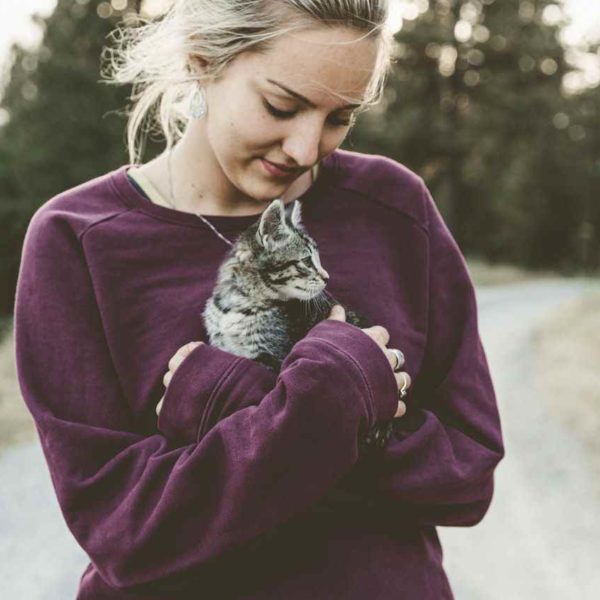
Leave a Comment